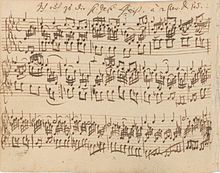I call to you, Lord Jesus Christ
I call to you, Lord Jesus Christ is a Lutheran hymn from the time of the Reformation . The text is attributed to Johannes Agricola ; for a long time it was considered the work of Paul Speratus . The composer of the is unknown; it appeared for the first time, together with the first print of the text, in a Hagenau song collection from 1526/27. In the Evangelical Hymnal the song is under the heading Justification and Confidence (No. 343).
shape
The stanza form is unique, it is not found in any other song. Each stanza consists of eight iambic and one trochaic lines (the seventh). The metric scheme is:
- yes 4myes 3wyes 4myes 3wyes 4myes 3wtr 2wyes 3myes 3w
The rhyme scheme is [ababcddcd].
It is noticeable that in the older prints the rhyme scheme is not maintained in all stanzas, but is used everywhere in the EC version.
content
The five stanzas are an individual's prayer to Jesus Christ . Life according to the word of Jesus (verse 1), preservation in hope until the hour of death (verse 2), forgiveness, strength to forgive and strengthen in adversity (verse 3), constant trust in the undeserving divine grace (verse 4) and protection in Temptation and contestation (verse 5) are the contents of the request. The prayer closes with the confession: "I know you will not stop."
Today's text
1. I call to you, Lord Jesus Christ,
I pray, hear my complaints;
grant me grace at this time,
do not let me despair.
The right faith, Lord, I
mean, you want to give me that,
to live to you, to be of use to my
neighbor,
to keep your word.
2. I ask even more, oh Lord God -
you can give it to me -
that I should not be ridiculed again;
give hope besides;
ahead, if I have to be here from the fact
that I can trust you
and not rely
on all my own actions,
otherwise I will regret it forever.
3.
Grant that from the bottom of my heart I may forgive my enemies;
forgive me at this hour too,
create a new life for me;
let your word be my food,
to nourish my soul,
to defend myself
when misfortune strikes,
which would soon pervert me.
4. Do not let me
turn away pleasure or fear from you in this world;
give to me to be constant at the end, it's in
your hands alone;
and to whom you give it, he has it for free;
no one may acquire it
or inherit it
by works of your favor,
which saves us from dying.
5. I am in conflict and reluctant,
help, O Lord Christ, the weak;
I stick to your grace alone,
you can make me stronger.
If there is now a challenge,
resist that it does not knock me over;
you can make
sure it doesn't harm me.
I know you won't let it go
Melody and arrangements
The calm, largely syllabic melody seems to have been composed for the text. The Doric mode is approximated to D minor by touching the 'b' twice - particularly expressive on “lament” and “despair” in stanza 1 - and brightens up in lines 5 and 8 after F major.
In accordance with its former importance, the song was edited many times in the Baroque period, e.g. B. by Dietrich Buxtehude (BuxWV 196), Johann Pachelbel (several) and Jan Pieterszoon Sweelinck . Johann Sebastian Bach based the complete text of his choral cantata BWV 177 of the same name . His expressively harmonized three-part F minor arrangement in the Orgelbüchlein ( ) was a favorite of the Romantic period and is still one of the favorites of organ students and concert programs.
Web links
Individual evidence
- ↑ a b Information for EG 343
- ↑ Hymns 1836
- ^ Weekly song on the 13th Sunday after Trinity
- ↑ In stanza 2 the penultimate line has one syllable too little; balanced on the ground floor. In stanza 3, “when misfortune comes about” does not rhyme with “let your word let my food go away”; EG instead: "when misfortune strikes". In stanza 4, “your grace through works” does not rhyme with “and to whom you give it has it free”; EG instead: "by works your favor".
- ↑ 1699: "the right way, O Lord"
- ↑ 1699: "on everything I do"
- ↑ 1699: "goes therefore"
- ↑ 1699: "turn away"
- ↑ 1699: "inherit"
- ↑ 1699: "acquire"
- ↑ 1699: "Grace"
- ↑ 1699: "Lord"
- ↑ 1699: "overturned"
- ↑ 1699: "measure" (in the sense of "moderate")

